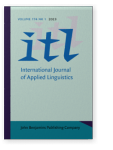Vol. 174:1 (2023) ► pp.3–48
Exploring underlying elements of the motivational self system among learners in two instructional contexts
Through the lens of Dörnyei’s (2005) Second Language Motivational Self System, this exploratory study focused on two groups of Canadian newcomers learning English in the traditional classroom setting (English as a Second Language [ESL]; n = 37) and the workplace (Workplace Language Training [WLT]; n = 29) to determine the role of motivation in their integration into Canadian society and development of the ‘Canadian self’. The results, collected by way of a questionnaire and follow-up interviews, show newcomers holding positive attitudes towards English learning and building their Canadian identity in the process. Notably, beliefs concerning the value of employment to fulfill personal obligations and duties promoted the WLT learners’ motivation and willingness to engage with language learning significantly more than those of their ESL counterparts. Pedagogical implications are discussed.
Article outline
- Introduction
- Literature review
- L2MSS theory
- L2MSS empirical findings
- Context of the study
- Method
- Context
- Participants
- Instruments
- Data analysis
- Results
- Research question 1
- Research question 2
- Discussion
- Pedagogical implications
- Limitations and future research
- Conclusion
- Acknowledgements
-
References
